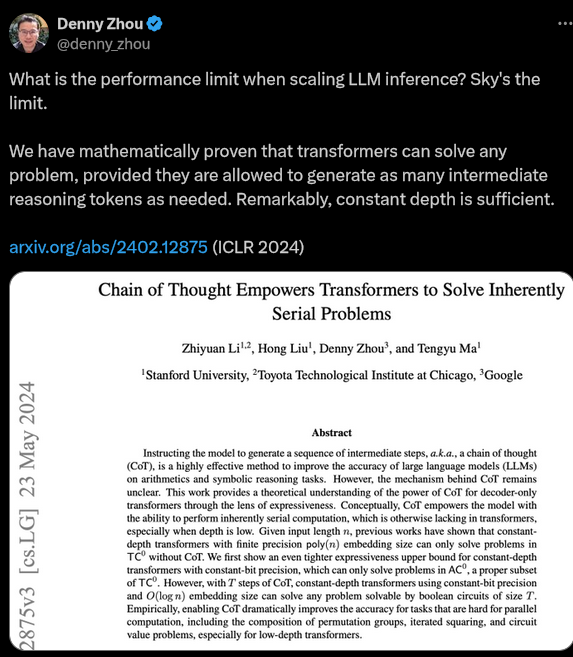Wondering if Modern LLMs like GPT4, Claude Sonnet and llama 3 are closer to human intelligence or next word predictor. Also not sure if this graph is right way to visualize it.
They’re still much closer to token predictors than any sort of intelligence. Even the latest models “with reasoning” still can’t answer basic questions most of the time and just ends up spitting back out the answer straight out of some SEO blogspam. If it’s never seen the answer anywhere in its training dataset then it’s completely incapable of coming up with the correct answer.
Such a massive waste of electricity for barely any tangible benefits, but it sure looks cool and VCs will shower you with cash for it, as they do with all fads.
deleted by creator
The “i” in LLM stands for “intelligence”
deleted by creator
Allanoi is going to be the name of a 0 INT Warforged character I’ll create ^^
A remarkable paper has just come out on this topic.

They’re still word predictors. That is literally how the technology works
Yeah, the only question is whether human brains are also just that.
no, they are not. try showing an ai a huge number of pictures of cars from the front. Then show them one car from the side, and ask them what it is.
Show a human one picture of a car from the front, then the one from the side and ask them what it is.
What if the human had never seen or heard of anything similar to cars?
I bet it’d be confused as much as the llm.
That’s why you show him one, before asking what that same car viewed from a different angle is.
I had never seen a recumbent bike before. I only needed to see one to know and recognize one whenever I see one. Even one with a different color or make and model. The human brain definitely works differently.
You know what bicycle are though. And you’re heard of recumbent bikes or things similar to it.
If you had never heard of anything similar at all to bikes, and saw a picture of a recumbent bike from the front only, you’d probably think “ I have no fucking idea what that is”.
Idk man, weird for you to think humans can kinda learn fully about something without all the required context.
you keep missing the fact that I don’t know out of nowhere. You would have just shown me one and told me what it was. Yes of course I’d be able to tell you what it was. You just taught me. With one example.
To understand a recumbent bicycle you have to understand bicycles. To understand bicycles you have to understand wheels. You have to understand humans, and human transportation. What IS transportation. What are roads. What is a pedal. What is steering. How physics works for objects in motion. Etc etc etc etc.
You truly underestimate the amount of context and previous knowledge you need to understand even the simplest things.
That’s literally how llma work, they quite literally are just next word predictors. There is zero intelligence to them.
It’s literally a while token is not “stop”, predict next token.
It’s just that they are pretty good at predicting the next token so it feels like intelligence.
So on your graph, it would be a vertical line at 0.
Agreed
What is intelligence though? Maybe I’m getting through life just by being pretty good at predicting what to say or do next…
yeah yeah I’ve heard this argument before. “What is learning if not like training.” I’m not going to define it here. It doesn’t “think”. It doesn’t have nuance. It is simply a prediction engine. A very good prediction engine, but that’s all it is. I spent several months of unemployment teaching myself the ins and outs, developing against llms, training a few of my own. I’m very aware that it is not intelligence. It is a very clever trick it pulls off, and easy to fool people that it is intelligence - but it’s not.
But how do you know that the human brain is not just a super sophisticated next-thing predictor that by being super sophisticated manages to incorporate nuance and all that stuff to actually be intelligent? Not saying it is but still.
Because we have reason, understanding. Take something as simple as the XY problem. Humans understand that there are nuances to prompts and questions. I like the XY because a human knows to step back and ask “what are you really trying to do?”. AI doesn’t have that capability, it doesn’t have reasoning to say “maybe your approach is wrong”.
So, I’m not the one to define what it is or on what scale. But I can say that it’s not human intelligence.
This is true if you describe a pure llm, like gpt3
However systems like claude, gpt4o and 1o are far from just a single llm, they are a blend of llm’s other machine learning (like image recognition) some old fashioned code.
Op does ask “modern llm” so technically you are right but i believed they did mean the more advanced “products”
That is just next word prediction with extra steps.
Now that is fair.
None of which are intelligence, and all of which are catered towards predicting the next token.
All the models have a total reliance on data and structure for inference and prediction. They appear intelligent but they are not.
How is good old fashioned code comparing outputs to a database of factual knowledge “predicting the next token” to you. Or reinforcement relearning and token rewards baked into models.
I can tell you have not actually tried to work with professional ai or looked at the research papers.
Yes none of it is “intelligent” but i would counter that with neither are human beings, we dont even know how to define intelligence.
No, unfortunately you are wrong.
Gpt4 is a better version of gpt3.
The brand new one that is allegedly “unhackable” just has a role hierarchy providing rules and that hasn’t been fulled tested in the wild yet.
Sure, they ‘know’ the context of a conversation but only by which words are most likely to come next in order to complete the conversation. That’s all they’re trained to do. Fancy vocabulary and always choosing the ‘best’ word makes them really good at appearing intelligent. Exactly like a Sales Rep who’s never used a product but knows all the buzzwords.
Intelligence is a measure of reasoning ability. LLMs do not reason at all, and therefore cannot be categorized in terms of intelligence at all.
LLMs have been engineered such that they can generally produce content that bears a resemblance to products of reason, but the process by which that’s accomplished is a purely statistical one with zero awareness of the ideas communicated by the words they generate and therefore is not and cannot be reason. Reason is and will remain impossible at least until an AI possesses an understanding of the ideas represented by the words it generates.
i think the first question to ask of this graph is, if “human intelligence” is 10, what is 9? how you even begin to approach the problem of reducing the concept of intelligence to a one-dimensional line?
the same applies to the y-axis here. how is something “more” or “less” of a word predictor? LLMs are word predictors. that is their entire point. so are markov chains. are LLMs better word predictors than markov chains? yes, undoubtedly. are they more of a word predictor? um…
honestly, i think that even disregarding the models themselves, openAI has done tremendous damage to the entire field of ML research simply due to their weird philosophy. the e/acc stuff makes them look like a cult, but it matches with the normie understanding of what AI is “supposed” to be and so it makes it really hard to talk about the actual capabilities of ML systems. i prefer to use the term “applied statistics” when giving intros to AI now because the mind-well is already well and truly poisoned.
what is 9?
exactly! trying to plot this is in 2D is hella confusing.
plus the y-axis doesn’t really make sense to me. are we only comparing humans and LLMs? where do turtles lie on this scale? what about parrots?
the e/acc stuff makes them look like a cult
unsure what that acronym means. in what sense are they like a cult?
Effective Accelerationism. an AI-focused offshoot from the already culty effective altruism movement.
basically, it works from the assumption that AGI is real, inevitable, and will save the world, and argues that any action that slows the progress towards AGI is deeply immoral as it prolongs human suffering. this is the leading philosophy at openai.
their main philosophical sparring partners are not, as you might think, people who disagree on the existence or usefulness of AGI. instead, they take on the other big philosophy at openai, the old-school effective altruists, or “ai doomers”. these people believe that AGI is real, inevitable, and will save the world, but only if we’re nice to it. they believe that any action that slows the progress toward AGI is deeply immoral because when the AGI comes online it will see that we were slow and therefore kill us all because we prolonged human suffering.
That just seems like someone read about Roko’s basilisk and decided to rebrand that nightmare as the mission/vision of a company.
What a time to be alive!

can you give an example of any third data point such as a rock or a chicken
rockegg
I’m going to say x=7, y=10. The sum x+y is not 10, because choosing the next word accurately in a complex passage is hard. The x is 7, just based on my gut guess about how smart they are - by different empirical measures it could be 2 or 40.
There’s a preprint paper out that claims to prove that the technology used in LLMs will never be able to be extended to AGI, due to the exponentially increasing demand for resources they’d require. I don’t know enough formal CS to evaluate their methods, but to the extent I understand their argument, it is compelling.
With GPT o1, I think there is a very small piece of intelligence at play, but it’s basically (8.5, 1.5) on this in my mind
Imo, which is backed a bit by some pretty new studies, not only do LLMs not have intelligence at all, they are incapable of it.
Human intelligence and conciousness likely has a lot to do with nanotubes that trigger quantum wave function collapse, and allow for decision making. Computers simply do not function in this way. Computers are processing machines. They have logic gates with 2 states. 101101110011 binary logic.
If new studies related to nanotubes are right biological brains are simply operating on an entirely diffetent level and playing by a different set of rules than computers. Its not a issue of getting the software right, or getting more processing power. Its an issue of physical capability of the machine to perform certain functions.
Shouldn’t those be opposite sides of the same axis, not two different axes? I’m not sure how this graph should work.
It could have both abilities right?
I’ll preface by saying I think LLMs are useful and in the next couple years there will be some interesting new uses and existing ones getting streamlined…
But they’re just next word predictors. The best you could say about intelligence is that they have an impressive ability to encode knowledge in a pretty efficient way (the storage density, not the execution of the LLM), but there’s no logic or reasoning in their execution or interaction with them. It’s one of the reasons they’re so terrible at math.












